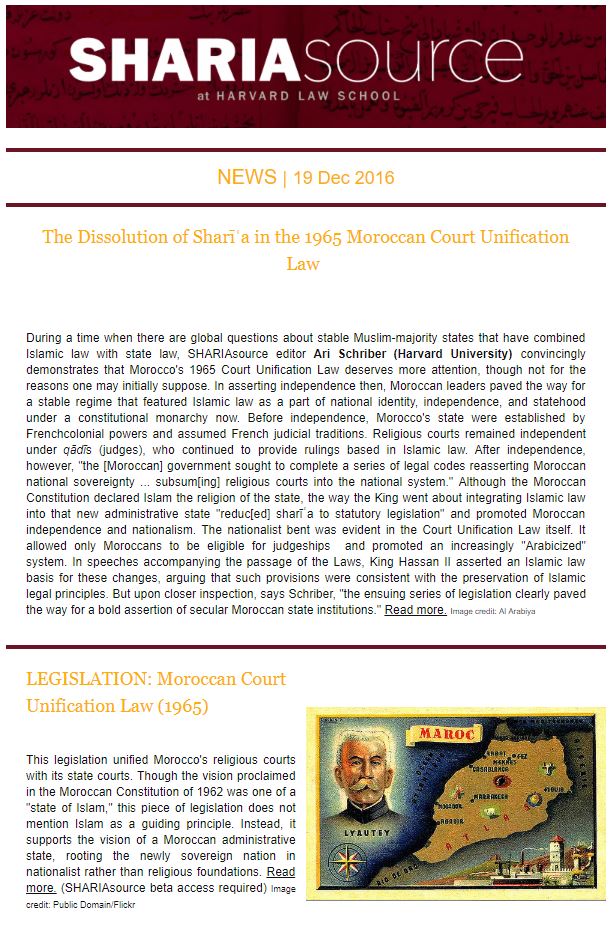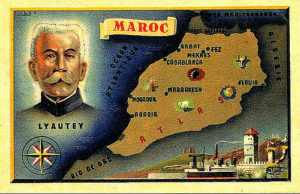
 The Dissolution of Sharīʿa in the 1965 Moroccan Court Unification Law During a time when there are global questions about stable Muslim-majority states that have combined Islamic law with state law, SHARIAsource editor Ari Schriber (Harvard University) convincingly demonstrates that Morocco’s 1965 Court Unification Law deserves more attention, though not for the reasons one may initially suppose. In asserting independence then, Moroccan leaders paved the way for a stable regime that featured Islamic law as a part of national identity, independence, and statehood under a constitutional monarchy now. Before independence, Morocco’s state were established by Frenchcolonial powers and assumed French judicial traditions. Religious courts remained independent under qādīs (judges), who continued to provide rulings based in Islamic law. After independence, however, “the [Moroccan] government sought to complete a series of legal codes reasserting Moroccan national sovereignty … subsum[ing] religious courts into the national system.” Although the Moroccan Constitution declared Islam the religion of the state, the way the King went about integrating Islamic law into that new administrative state “reduc[ed] sharīʿa to statutory legislation” and promoted Moroccan independence and nationalism. The nationalist bent was evident in the Court Unification Law itself. It allowed only Moroccans to be eligible for judgeships and promoted an increasingly “Arabicized” system. In speeches accompanying the passage of the Laws, King Hassan II asserted an Islamic law basis for these changes, arguing that such provisions were consistent with the preservation of Islamic legal principles. But upon closer inspection, says Schriber, “the ensuing series of legislation clearly paved the way for a bold assertion of secular Moroccan state institutions.” Read more. Image Credit: Wikipedia
The Dissolution of Sharīʿa in the 1965 Moroccan Court Unification Law During a time when there are global questions about stable Muslim-majority states that have combined Islamic law with state law, SHARIAsource editor Ari Schriber (Harvard University) convincingly demonstrates that Morocco’s 1965 Court Unification Law deserves more attention, though not for the reasons one may initially suppose. In asserting independence then, Moroccan leaders paved the way for a stable regime that featured Islamic law as a part of national identity, independence, and statehood under a constitutional monarchy now. Before independence, Morocco’s state were established by Frenchcolonial powers and assumed French judicial traditions. Religious courts remained independent under qādīs (judges), who continued to provide rulings based in Islamic law. After independence, however, “the [Moroccan] government sought to complete a series of legal codes reasserting Moroccan national sovereignty … subsum[ing] religious courts into the national system.” Although the Moroccan Constitution declared Islam the religion of the state, the way the King went about integrating Islamic law into that new administrative state “reduc[ed] sharīʿa to statutory legislation” and promoted Moroccan independence and nationalism. The nationalist bent was evident in the Court Unification Law itself. It allowed only Moroccans to be eligible for judgeships and promoted an increasingly “Arabicized” system. In speeches accompanying the passage of the Laws, King Hassan II asserted an Islamic law basis for these changes, arguing that such provisions were consistent with the preservation of Islamic legal principles. But upon closer inspection, says Schriber, “the ensuing series of legislation clearly paved the way for a bold assertion of secular Moroccan state institutions.” Read more. Image Credit: Wikipedia
 LEGISLATION: Moroccan Court Unification Law (1965) This legislation unified Morocco’s religious courts with its state courts. Though the vision proclaimed in the Moroccan Constitution of 1962 was one of a “state of Islam,” this piece of legislation does not mention Islam as a guiding principle. Instead, it supports the vision of a Moroccan administrative state, rooting the newly sovereign nation in nationalist rather than religious foundations. Read more. Image credit: Public Domain/Flickr
LEGISLATION: Moroccan Court Unification Law (1965) This legislation unified Morocco’s religious courts with its state courts. Though the vision proclaimed in the Moroccan Constitution of 1962 was one of a “state of Islam,” this piece of legislation does not mention Islam as a guiding principle. Instead, it supports the vision of a Moroccan administrative state, rooting the newly sovereign nation in nationalist rather than religious foundations. Read more. Image credit: Public Domain/Flickr
 IN SUMMARY:: Policy Roundtable: Understanding Sharīʿa: Implications for Policy and Conflict Resolution, 13 Dec, USIP, Washington, DC A policy roundtable on Islamic law, co-sponsored by the Islamic Legal Studies Program: SHARIAsource and the United States Institute of Peace, and held on December 13 at USIP, was a first-of its-kind program that brought together a broad cross-section of individuals working in federal government, academic, and non-governmental organizations on policy issues related to Islamic law. The program focused on exploring the major features, structures, and processes of law-making in Islamic law historically and in the present. Read more. Image Credit: Wikipedia
IN SUMMARY:: Policy Roundtable: Understanding Sharīʿa: Implications for Policy and Conflict Resolution, 13 Dec, USIP, Washington, DC A policy roundtable on Islamic law, co-sponsored by the Islamic Legal Studies Program: SHARIAsource and the United States Institute of Peace, and held on December 13 at USIP, was a first-of its-kind program that brought together a broad cross-section of individuals working in federal government, academic, and non-governmental organizations on policy issues related to Islamic law. The program focused on exploring the major features, structures, and processes of law-making in Islamic law historically and in the present. Read more. Image Credit: Wikipedia
See the full newsletter.

